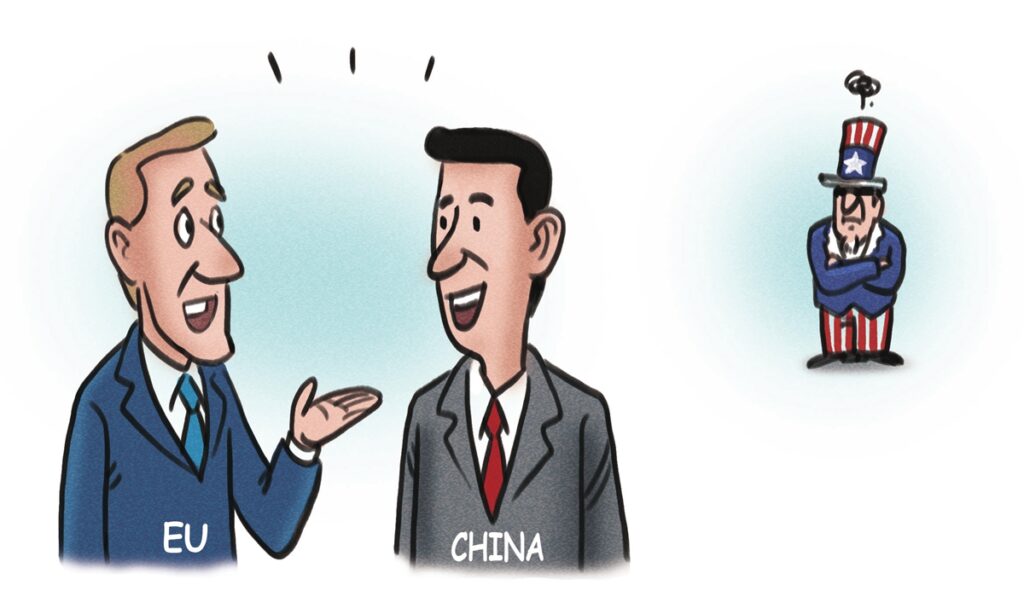China-EU-US Illustration: Liu Rui/GT
By Wang Xiaoguang
In the wake of the increasingly tense US-China economic dispute that has spilled over into diplomatic and security dimensions, Europe silently becomes the key player in the stalemate. Speaking of the online EU-China summit, some observers even considered the possibility that China might “play Nixon” to draw Brussels into favor Beijing in the US-China – a Cold War-like analogy. This refers to the period when trans-Atlantic relations witnessed a split on several issues. Actually, such point of view has far overestimated the divergence of the trans-Atlantic alliance and the EU-China relationship.
From many points of view, the “Nixon moment” is ill in analogy. Before President Richard Nixon’s historic trip to China in 1972, the China-Soviet Union relations had been bleak for about a decade. The two countries experienced long-lasting ideological wrangles, economic isolation and deadly armed conflict. Meanwhile, the US was at relatively low ebb in the comprehensive competition with the Soviet Union. However, these factors are not true in the case of the relations among the Washington, Beijing and Brussels, whose economies are highly entangled. In addition, China is neither willing nor capable to move Brussels to depart Washington and sit on Beijing’s side.
In terms of the trans-Atlantic relations, although there are tiny quarrels, the foundation in every aspect is solid: security, economy and the global order. The disagreements from the European side are mostly targeted at US President Donald Trump’s policies, not the US as a whole. In addition, to dislike Trump does not necessarily mean the EU stands against every Trumpist policy. The EU rationally is pleased to see China making compromises in trade and domestic regulatory rules under the Washington’s pressure. Therefore, the EU is too feeble to impose its will. In addition, the US is critical for European security, considering the recent unease in Belarus and the Novichok scandal. The above points even do not include the long-term importance of trading with the US for the EU, making more than 152 billion euros ($180 billion) surplus in trade for the EU in 2019.
By comparison, there are several structural impasses in EU-China relations. The EU is more steadfast to advocate normative politics in international relations. Although the EU has divergent standpoints with the Trump administration, Brussels has never considered China as a better alternative solution. In fact, many frustrations have accumulated in the EU in past years, on issues such as China-Central and Eastern Europe cooperation, and expansion of China’s economic presence in Europe’s high-tech business sector. Recently under the backdrop of the COVID-19 pandemic, the rise of hardliners is also a remarkable phenomenon in Europe.
Therefore, the videoconference between the leaders of the EU and China certainly will not spell out a “Nixon moment.” The press release issued by the EU after the summit also supports the evaluation, in which the European leaders used heavy wording to express disagreement. Some calls regarding economic relations with China are also Trump-like. In the future, keeping the EU-China relation pragmatic and independent could be the best scenario.
Although it is unrealistic and ill in logic, the anxiety surrounding a “Nixon moment” from the US illustrates that the unilateral actions of the Trump administration have hurt the trans-Atlantic alliance – especially with key EU member states like Germany. Around the issues of the financial burden of NATO and the proposed (and almost completed) Nord Stream-2 natural gas pipeline, Berlin has received mounting pressure from the White House. The confusing trans-Atlantic relation may deteriorate with failed coordination between the US and the EU in the fight against the pandemic. From another preservative, the “Nixon moment” imagination also reflects the notion that the US will not give up global leadership ambitions and not go to isolationism. By contrast, the US may start to notice the importance of the European alliance in US hegemony – especially when US’ relation with China might become more confrontational in the future. Global Times


